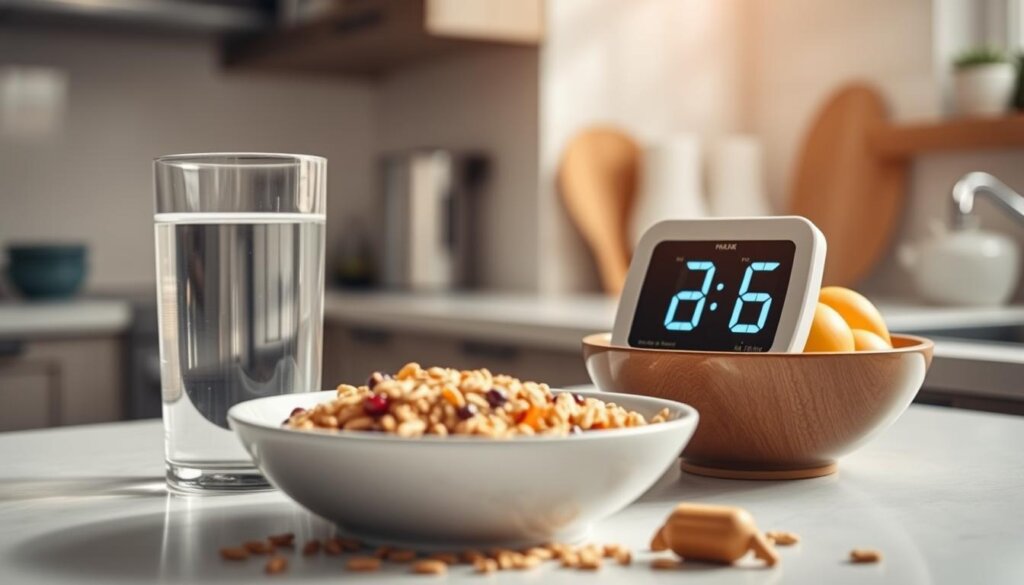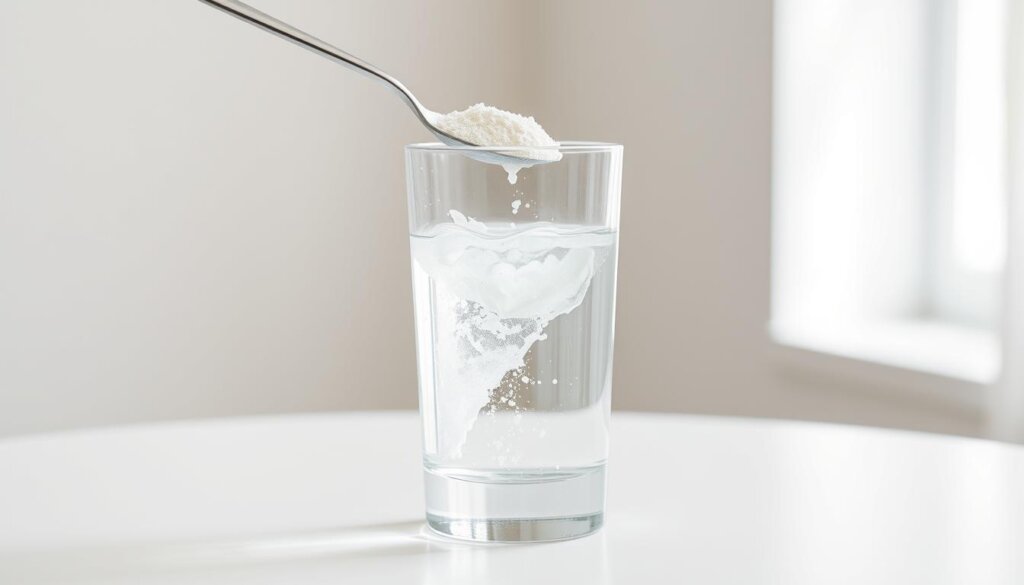Best Time to Take Fiber? Malaysian Nutritionists Answer
A staggering 93% of Americans fall short of their daily fiber needs, and it’s likely that Malaysians face a similar issue. With modern diets dominated by processed foods, it’s easy to miss out on this essential nutrient. The result is a range of health issues, from gut imbalances to weakened immunity.
In Malaysia, health awareness is on the rise, and fiber is playing a key role. The gut houses trillions of microbes that thrive on fiber, and without enough, digestion suffers, and overall wellness declines.
Malaysian nutritionists from Wellness Group have shared their expert insights on the optimal timing for fiber consumption. Understanding when to take fiber can significantly impact its effectiveness for digestive health and overall wellness.
Key Takeaways
- Most Malaysians aren’t getting enough fiber in their daily diets.
- The optimal timing for fiber consumption varies based on individual health goals.
- Fiber supplements can support digestive health and weight management.
- Proper hydration is essential to maximize the benefits of fiber supplements.
- A healthy lifestyle complements the effectiveness of fiber intake.
The Fiber Gap: Why Most Malaysians Need More

Click to LEARN MORE
The typical Malaysian diet has been observed to lack sufficient fiber, aligning with global trends of low fiber intake. This deficiency is a concern as fiber plays a crucial role in maintaining overall health and supporting the body’s needs for optimal functioning.
Fiber Intake Statistics in Malaysia
Studies have shown that many Malaysians do not meet their daily fiber intake requirements. For more information on sources of fiber, you can visit Wellness Group’s blog on fiber sources.
Recommended Daily Fiber Requirements
The USDA recommends the following daily fiber amounts: 38g for men under 50, 25g for women under 50, and 21-30g for adults over 50. Malaysian health authorities align with these international guidelines, emphasizing the importance of a dietary plan that includes a variety of whole foods to meet these needs.
By understanding and addressing the fiber gap, Malaysians can take a significant step towards improving their overall health and reducing the risk of various health issues.
Understanding Different Types of Fiber
Dietary fiber comes in various forms, but it is primarily categorized into two types: soluble and insoluble fiber. Both play crucial roles in maintaining a healthy digestive system and overall well-being.
Soluble Fiber and Its Benefits
Soluble fiber dissolves in water, forming a gel-like substance that helps slow down digestion. This type of fiber is found in foods such as oats, barley, nuts, and fruits. It aids in lowering cholesterol levels and regulating blood sugar levels, making it beneficial for heart health and diabetes management.
Insoluble Fiber and Its Role in Digestion
Insoluble fiber, on the other hand, does not dissolve in water but adds bulk to stool, facilitating regular bowel movements. It acts like nature’s broom, sweeping through the intestines and preventing constipation. Rich sources include whole grains like brown rice and wheat bran, as well as vegetables such as cauliflower and green beans.
- Insoluble fiber helps accelerate the passage of food and waste through the digestive tract.
- Regular consumption can reduce the risk of diverticular disease and hemorrhoids.
- Many fiber-rich foods contain both soluble and insoluble fiber, emphasizing the importance of a diverse diet.
When Is the Best Time to Take Fiber? Malaysian Nutritionists Answer
According to Malaysian nutritionists, the timing of fiber consumption can significantly impact its effectiveness. The debate surrounding the optimal time to take fiber supplements has led to various recommendations.
Morning: Optimal for Weight Management and Energy
Consuming fiber in the morning can aid in weight management by promoting satiety throughout the day. It can also help stabilize energy levels, supporting overall daily activities.
Evening: Benefits for Overnight Digestion
Taking fiber supplements in the evening supports overnight digestion, allowing the fiber to work gradually through the digestive system while you sleep. This timing can help promote morning regularity and prevent late-night snacking by keeping you fuller for longer.
| Timing | Benefits |
|---|---|
| Morning | Weight management, energy stabilization |
| Evening | Overnight digestion, morning regularity, reduced late-night snacking |
Malaysian nutritionists recommend spacing fiber intake at least two hours before bedtime to minimize bloating risks. For individuals taking psyllium husk, evening consumption paired with adequate water has shown significant improvements in digestive regularity and morning comfort.

Benefits of Taking Fiber in the Morning
Incorporating fiber into your morning routine can enhance overall well-being. Consuming fiber in the morning sets a healthy tone for the day, providing benefits that last throughout the day.
Promoting Satiety Throughout the Day
Morning fiber intake helps promote satiety, keeping you fuller for longer. This can be particularly beneficial for weight management, as it reduces the likelihood of overeating or snacking between meals. A study found that consuming fiber-rich foods in the morning can lead to reduced calorie intake throughout the day.
Stabilizing Blood Sugar Levels
Fiber plays a crucial role in stabilizing blood sugar levels by slowing the absorption of sugar into the bloodstream. This effect is particularly beneficial after breakfast, providing a steady source of energy. Research indicates that a daily intake of 7.6 to 8.3 grams of fiber from supplements can significantly reduce HbA1c levels and fasting blood sugar in adults with type 2 diabetes.
| Benefits | Description |
|---|---|
| Promotes Satiety | Helps in weight management by reducing the likelihood of overeating |
| Stabilizes Blood Sugar | Slows the absorption of sugar, providing a steady source of energy |
| Supports Digestive Health | Enhances overall digestive well-being |
Benefits of Taking Fiber in the Evening
Consuming fiber in the evening can have numerous health benefits, particularly for digestive regularity and sleep quality. A well-functioning gut microbiome is crucial for overall health, and fiber plays a key role in maintaining this balance.
Supporting Digestive Regularity

Click to LEARN MORE
Evening fiber intake can support regular bowel movements by stimulating the digestive system before sleep. This can lead to more consistent and comfortable digestion. A healthy gut microbiome, supported by regular fiber intake, can also reduce inflammation and promote overall gut health.
Improving Sleep Quality

Click to LEARN MORE
Emerging research suggests that evening fiber consumption may also improve sleep quality. The fermentation of fiber by gut bacteria produces short-chain fatty acids, which can influence neurotransmitter production and promote relaxation. For more information on the best time to take fiber, you can visit Wellness Group’s blog.
| Benefits | Description |
|---|---|
| Regular Bowel Movements | Evening fiber intake stimulates the digestive system, promoting consistent and comfortable digestion. |
| Improved Sleep Quality | Fiber fermentation produces short-chain fatty acids, influencing neurotransmitter production and promoting relaxation. |
| Gut Health | A healthy gut microbiome, supported by fiber intake, reduces inflammation and promotes overall gut health. |
How to Incorporate Fiber Supplements into Your Daily Routine
Malaysian nutritionists recommend a few simple steps to effectively incorporate fiber supplements into your daily routine. By following these guidelines, you can maximize the benefits of fiber supplements while minimizing potential side effects.
Starting Slow to Avoid Discomfort
When introducing fiber supplements into your diet, it’s essential to start with a low dose to allow your digestive system to adjust. Gradually increasing your fiber intake helps prevent discomfort, such as bloating or gas. This approach enables your gut microbiome to adapt, ensuring a smoother transition to a higher fiber diet.
Pairing Fiber with Adequate Water Intake
Adequate hydration is crucial when taking fiber supplements. Drinking at least 8 ounces of water with each fiber dose and staying hydrated throughout the day helps fiber move through your digestive system effectively. The ideal water intake is about 35ml per kg of body weight daily, which is particularly important in Malaysia’s hot and humid climate. Visual cues, such as pale yellow urine, can help ensure you’re drinking enough water.

Top Fiber Supplements for Digestive Health
Fiber supplements are increasingly recognized for their benefits in supporting gut health. With various options available, Malaysian nutritionists recommend choosing supplements that are backed by scientific evidence.

Psyllium-Based Products
Psyllium-based fiber supplements are known for their ability to promote digestive regularity. They work by absorbing water to form a gel-like substance that helps soften and move stool through the digestive system.
These products are often recommended for individuals experiencing constipation or irregular bowel movements.
Prebiotic Fiber Options
Prebiotic fiber supplements, such as inulin and fructooligosaccharides (FOS), feed beneficial gut bacteria, supporting a healthy gut microbiome. Garden of Life’s formulas provide 9g of prebiotic fiber per serving from organic sources, promoting the growth of beneficial bacteria like bifidobacteria.
- Prebiotic fiber supplements improve the diversity and health of the gut microbiome.
- Popular prebiotic options include inulin, FOS, and galactooligosaccharides (GOS), which nourish beneficial bacterial strains.
- These supplements support the production of short-chain fatty acids, strengthening the gut lining and reducing inflammation.
Potential Side Effects and How to Avoid Them
Understanding the potential side effects of fiber supplements is crucial for a safe and healthy intake. While generally considered safe, fiber supplements can cause some adverse reactions, particularly when first introduced into the diet.
Common Digestive Reactions
Mild digestive adjustment symptoms are normal when starting fiber . These can include bloating, gas, or slight stomach discomfort. To minimize these effects, it’s recommended to start with a low dose and gradually increase fiber intake as the body adjusts.
When to Consult a Healthcare Professional
Certain individuals should consult a healthcare professional before starting fiber supplements, including those with existing digestive conditions like IBS, Crohn’s disease, or ulcerative colitis. Pregnant and breastfeeding women should also seek guidance due to their specific nutritional needs. Red flags that necessitate immediate medical attention include severe abdominal pain, blood in stool, or unexplained weight loss. For personalized advice, Wellness Group’s nutritionists can be reached at +60123822655 during business hours.
Wellness Group's Expert Recommendations
The Wellness Group’s expert nutritionists provide tailored advice on fiber supplements and products for Malaysians. Their guidance is centered around achieving optimal digestive health and meeting individual health goals.
Personalized Fiber Plans for Malaysian Lifestyles
The Wellness Group offers personalized advice on fiber intake, taking into account the unique dietary needs and lifestyles of Malaysians. Their team of qualified nutritionists creates customized plans to help individuals incorporate fiber supplements into their daily routines at the right times for maximum benefit.
How to Reach Our Nutritionists
Malaysians can reach the Wellness Group’s nutritionists through various channels, including WhatsApp at +60123822655 during business hours. The team is available for general consultations from Monday to Friday, 9:30 AM to 6:30 PM, and on Saturdays from 10 AM to 5 PM. For urgent inquiries, individuals can call or walk in until 5 PM on any day.
Conclusion
By understanding the best time to take fiber, individuals can make informed decisions about their health. Balancing fiber intake supports long-term digestive health, with morning use aiding metabolism and evening doses promoting overnight regularity.
To maximize benefits, it’s essential to start slow and increase fiber supplements by 1-2g per day to avoid bloating. Pairing fiber with adequate water intake is also crucial. For personalized advice on managing weight and improving bowel health, consider consulting with a healthcare professional or reaching out to Wellness Group’s nutritionists via WhatsApp at +60123822655.
FAQ
What is the recommended daily fiber intake?
The daily recommended fiber intake varies by age and sex, but generally, adults should consume around 25-30 grams of fiber per day to support optimal gut health and bowel regularity.
Can I get enough fiber from my diet alone?
While it’s possible to meet your fiber needs through a balanced diet rich in whole foods, many people find it challenging to consume enough fiber from dietary sources alone, making supplements a helpful addition.
How do I choose the right fiber supplement?
When selecting a fiber supplement, consider your individual needs, such as promoting digestive regularity or supporting healthy blood sugar levels, and choose a product that contains a type of fiber that aligns with your goals, such as psyllium or prebiotic fibers.
What are the benefits of taking fiber in the morning?
Taking fiber in the morning can help promote satiety throughout the day, support healthy blood sugar levels, and boost energy levels, making it an ideal time for those looking to manage their weight or improve overall digestive health.
Can taking fiber in the evening help with sleep?
Some research suggests that taking fiber in the evening can help support digestive regularity and promote a restful night’s sleep, although individual results may vary, and more research is needed to confirm this benefit.
How much water should I drink when taking fiber supplements?
It’s essential to drink plenty of water when taking fiber supplements to help the fiber move through your digestive system and minimize the risk of discomfort or constipation, aiming for at least 8-10 glasses of water per day.
What are the potential side effects of taking fiber supplements?
Common side effects of taking fiber supplements include bloating, gas, and abdominal discomfort, although these effects are often temporary and can be minimized by starting with a low dose and gradually increasing as needed.
Can I take fiber supplements if I have a sensitive stomach?
If you have a sensitive stomach, it’s crucial to start with a low dose of fiber and gradually increase as needed, and consider choosing a supplement that is gentle on the stomach, such as a psyllium-based product, and consult with a healthcare professional for personalized guidance.

Khloe Tan
Khloe Tan is a Certified Nutritionist, Corporate Wellness Trainer, and Holistic Health Specialist with over 15 years of experience in the health and wellness industry. She has delivered more than 100 talks nationwide, inspiring and educating diverse audiences on nutrition, lifestyle, and sustainable wellness. Her work has positively impacted over 3,000 lives, and she continues to champion holistic approaches to well-being in both corporate and personal settings.
Feature Product
-
Hydrogen Water FIlter/Generator
H2zen Portable (White/ Blue)
RM2,600.00 Add to cart Buy NowRated 0 out of 5





